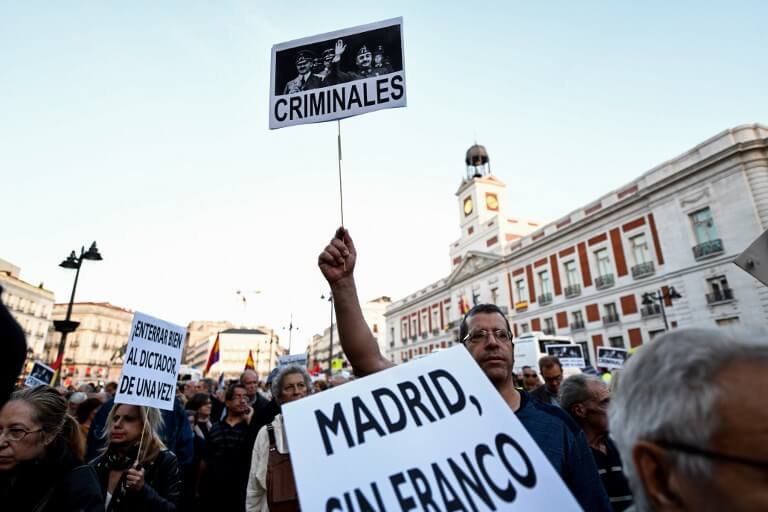The Spanish government has taken steps to amend the draft Democratic Memory Law, in a move that could mean crimes committed during the Franco era being prosecuted, having previously been protected until now – although even if the law is eventually passed, it remains highly unlikely that any cases would come to court.
The amendment, filed by the coalition government consisting of the socialist PSOE party and left-wing Podemos group, seeks to ensure that crimes committed during the regime of former dictator Francisco Franco no longer go unpunished.
The original ‘Amnesty Law’ was passed in 1977, when it was approved during the transitionary period following Franco’s death. It allowed the release of political prisoners from jail and went on to prevent any attempts to prosecute those involved with any potential offences relating to the dictatorship era before 1977.
The amendment, which was filed at the last moment by PSOE and Podemos, states: ‘All the laws of the Spanish state, including the Law 46/1977, of October 15, of Amnesty, will be interpreted and applied in accordance with conventional international and common law, and in particular, with International Humanitarian Law, according to which war crimes, crimes against humanity, genocide and torture are considered to have no statute of limitations nor can be subject to amnesty.’
This proposed amendment would potentially allow crimes committed during the Franco regime to be prosecuted by the Spanish justice system.
However, it will still have to be seen if such a change eventually has any success in the courts, due to the fact that Spain’s Supreme Court has established very clear case law against any prosecution of Franco-era crimes.
So far, any attempts for crimes committed under the Franco regime to be pursued by the Spanish justice system have failed due to the 1977 Amnesty Law – including an initiative from former High Court judge Baltasar Garzón. Up to now the only legal proceedings related to the Franco era that have made any progress have been filed in Argentina.
Representatives from Podemos have said that it would not be possible to annul the Amnesty Law, as the legislation had been seen as a significant achievement for democrats at the time of its approval. However, the party supports the amendment that effectively allows for the prosecution of those involved with crimes during the regime.

Speaking about the amendment and its intentions, Enrique Santiago, General Secretary of the Spanish Communist Party and one of the main negotiators in the draft amendment, said that ‘so many years after the death of the dictator, we are taking very solid steps toward his crimes no longer having impunity’.
Highlighting why it is important that the amendment is approved, he went on to say that ‘this is, without doubt, the last opportunity for our country after so many years. This is the only Western country where impunity has been the trend with this kind of crime. This is a day to be satisfied’.
With reference to the Amnesty Law’s original intentions and the importance of amending it now, he said that ‘this will correct the interpretation of the courts. The Amnesty Law will not be able to be used any more as an excuse’.
Santiago acknowledged that the amendment may be considered too late by many of those affected by crimes committed during the regime, saying ‘the majority of those responsible are dead … but any Francoist minister or any person who has committed torture could face trial. Regardless of whether or not they can be punished, a judicial truth can be established, and that in itself can have a reparatory effect for the victims’.
More than 500,000 people died in the war between rebel nationalists forces led by Franco and defenders of a short-lived Spanish Republic.
Franco then declared victory on 1 April 1939 and ruled ruthlessly until his death in 1975. It is estimated that 114,000 civilians disappeared, presumably killed, throughout the dictatorship.
Campaign groups say that more than 100,000 bodies are still in unmarked mass graves across Spain.
The amendments proposed to the Amnesty Law are seen as an important step to address measures that have protected those responsible for these crimes. It will also include amendments to law that prohibit the exhibition of portraits and other artistic representations of figures linked to the Franco regime.
There are also measures in the proposed amendments that will force the withdrawal of nobility titles awarded to 33 people associated with activities of the Franco regime, as well as renaming the Valley of the Fallen monument in Madrid.
ALSO READ: New ‘Democratic Memory’ law will help find mass graves of the Franco regime
ALSO READ (20/9/20): Spain drafts bill of ‘Democratic Memory Act’ to redress victims and legacy of Franco regime
ALSO READ (25/10/19): Franco removed but ‘Francoism still very present’, argue many
ALSO READ (16/2/19): Spotlight: ‘When you attack Franco, you attack over half of Spain’
Sign up for the FREE Weekly Newsletter from Spain in English.
Please support Spain in English with a donation.
Click here to get your business activity or services listed on our DIRECTORY.
Click here for further details on how to ADVERTISE with us.


